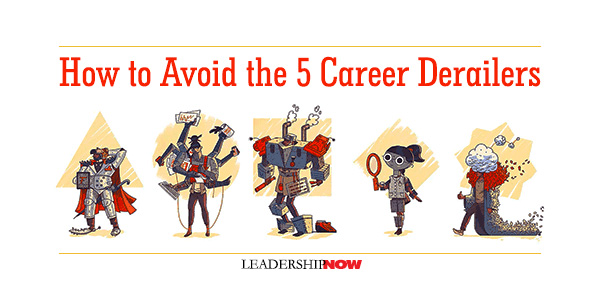 |
 |
01.10.18

How to Avoid the 5 Career Derailers
W In The Right—and Wrong—Stuff, Carter Cast shares with us the turning point in his career at PepsiCo. Blissfully unaware of how negative perceptions were shaped, he was stunned when called into his boss’s office, and told he was “unpromotable” because he was obstinate,” “resistant,” and “insubordinate.” More often than not, people get fired, demoted, or plateau not because they lack the “right stuff,” but because they let the “wrong stuff” act out. Cast’s research led him to five defining archetypes. These archetypes are present across all organizations, genders, and levels of seniority. Captain Fantastic
As you progress [in your career], your relationship with others is more important than your knowledge of and relationship with data. This need kicks in as you move into middle and upper management. It’s a mindset change. You have to suppress your ego, let go of having the answer and embrace the relational world. It becomes less about having competencies and more about engendering trust. The Solo Flier
For many talented people “skilled in and rewarded for ‘doing,’ the shift to manager and leader is a hard one. We’re required to operate differently, getting work done through others, moving from athlete to coach. We need to move from ‘me’ to ‘we.’” Version 1.0
Version 1.0’s resist learning new experiences. They lack curiosity preferring the status quo. Agility in your personal learning is the “subtle skill of picking up on cues and changing one’s behavior quickly.” Cast recommends that Version 1.0’s become more approachable. “Some people’s fear of change can be masked as assured arrogance or by being a contrarian. They protect themselves by being rigid and aloof and acting with complete assurance. Then, when challenged with a contrary point of view, they become combative and aggressive, like Captain Fantastic.” The One-Trick Pony
This archetype is not strategic. That is, they lack a holistic understanding of the organization. “People with a strong strategic orientation approach problems from an ‘outside-in’ perspective.” The Whirling Dervish
Whirling Dirvish’s need to be in tune with the steps in “the work flow process—their proper sequence, how long each will take to complete, and whom to include along the way.” This includes being able to plan and prioritize tasks before a project is started. Say no when you have to and delegate task to keep things moving. Having the Right Stuff To avoid derailing, you must learn to lead yourself first. We all come close to derailing from time to time, but having the right stuff means that you have the “ability to bounce back, to learn from your mistakes, make adjustments, take corrective actions, and get back on track.” Cast finds that people with the right stuff act on their own initiative, they have emotional intelligence, and have tremendous perseverance and drive for results. And of the three, taking the initiative is the most important. “High performers with the right stuff accelerate their personal and professional development be having a ‘learning orientation’—a curiosity to constantly learn and improve. Avoiding derailing requires that you continuously reflect on your performance. Know where you want to go and understand where you are. Then take steps to bridge the gaps. Cast provides abundant examples of the archetypes and corrective measures for each. We are all a work-in-progress. Carter Cast provides an assessment on his website to find out where your career is vulnerable. 
Posted by Michael McKinney at 11:17 PM
|
BUILD YOUR KNOWLEDGE
 

How to Do Your Start-Up Right STRAIGHT TALK FOR START-UPS 
Grow Your Leadership Skills NEW AND UPCOMING LEADERSHIP BOOKS 
Leadership Minute BITE-SIZE CONCEPTS YOU CAN CHEW ON 
Classic Leadership Books BOOKS TO READ BEFORE YOU LEAD |